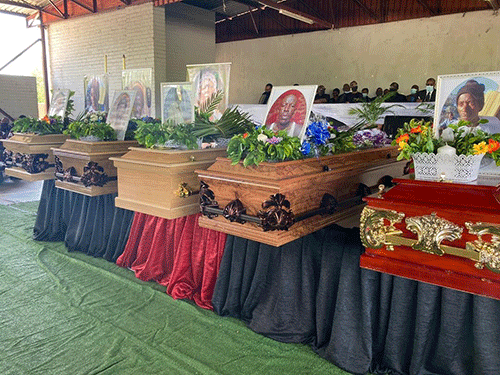The Kasane Magistrate’s Court in Botswana yesterday ruled in favour of that country’s defence force, absolving it from gross negligence and liability for criminal litigation in the brutal killing of three Nchindo brothers and their Zambian cousin in 2020.
A pressure group formed after the deaths of the fishermen, yesterday expressed dismay and vowed to take the matter further.
“We are now going to file heads of argument to send to SADC, AU and the UN. We have requested for the court records and the verdict to give it to our international lawyers to stage a high profile case against Botswana at the UN,” said Namibia Lives Matter Movement leader Sinvula Mudabeti.
The three brothers, Tommy (48), Martin (40) and Wamunyima Nchindo (36), and their cousin Sinvula Muyeme (44), were shot by the BDF on 5 November 2020 along the Chobe River.
Kasane regional magistrate Taboka Mopipi maintained that contrary to sentiments that the BDF were heavy-handed, evidence shows that they always act within the confines of the law.
“It is my findings that it cannot be held that the action of the seven Botswana Defence Force members amounted to so gross negligence so as to constitute criminal liability for the deaths of the four deceased persons.
They are held not criminally liable and accordingly, they are absolved from any criminal charges.”
The purpose of the inquest was to determine whether anyone should be held responsible for the death and whether there was any illegality committed.
She said evidence suggests that in many incidents when the BDF arrested Namibians fishing illegally in Botswana, they usually released them the next day.
“In this incident, something unusual must have happened to cause the BDF to deviate from their normal character,” Mopipi said according to the paper.
Meanwhile, testimonies throughout the inquest revealed that the BDF carried out an independent search immediately after the incident and did not find any guns.
Another joint search with Namibian Police scuba divers was carried out at the scene on 19 November, which once again did not yield any firearms. The search was called off because the area was allegedly infested with hippos.
BDF soldiers fired 32 bullets, which killed the Namibian men, according to the inquest.
Botswana police assistant commissioner Kutlwano Eanya said there was no need to collect the guns used since the soldiers already admitted they shot and killed the men.
“The gun is crucial evidence, but does not affect our case,” Eanya said. As far as Eanya was concerned, the soldiers did not plant any evidence, such as the three elephant tusks, which were allegedly found in possession of the brothers and their cousin at the time of their deaths.
“I also don’t think the BDF deliberately left the elephant tusks in the water. It was also not important to send the tusks for fingerprint analysis,” he said.
Apart from the missing gun and the elephant tusks, Botswana crime scene investigator, inspector Michael Josaya presented two canoes, two spears, four pedals, two black containers, and clothes as evidence in court.
Josaya also revealed that they recovered the money, national documents, passport photos, and cell phones when they searched the bodies of the deceased. However, George Nchindo, the deceased’s older brother, rejected this evidence. George during the inquest maintained that the elephant tusks did not belong to his brothers. He said the family recognised the spears, paddles, containers, and canoes, but not the elephant tusks, and he did not know of a gun in their possession.
“We are also wondering where my brothers’ fishing nets are. Why have they omitted this from the evidence? because it was in the canoes,” he said.
The Zambezi governor, who was at the ruling in Kasane, told NBC that the ruling was biased and that Namibians who testified were not taken seriously. He also said the player can’t be the referee.
– ktjitemisa@nepc.com.na


